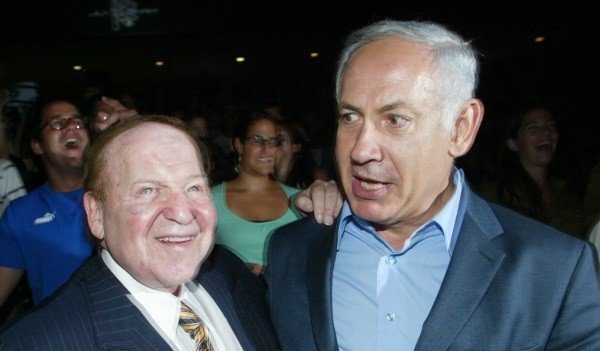Many of us feel dismay at the state of politics in which
a party elects a casino-pimp to represent their voters. But however disturbing
and shameful, Oren Hazan is just a small village fool. I do find it interesting
that the trumped up businessman turned presidential candidate also found his
charitable way to the casino.

And then, Sheldon Adelson, financier of Trump and
Netanyahu, has contributed to humanity by earning his fortune by the addicted
unfortunates who visit his casinos, then are deluded to support his extremist protégées,
themselves gamblers on the political stage, with people's fate at stake.
Just like in Israel religion should preferably be
separated from politics, to the benefit of both religion and politics, the time has come to separate casinos
from politics.
In Israel, said casino magnate owns a newspaper
which, just like Pravda in the Soviet Union, serves as megaphone for
the regime - the same extremist Netanyahu government that wants to limit free press and media, restrict organizations that oppose his rule
and strip citizenship from loud opponents to the occupation.
While I personally may neither agree with Netanyahu, nor always with some of his opponents, their right to express themselves freely must be defended in a democracy.
While I personally may neither agree with Netanyahu, nor always with some of his opponents, their right to express themselves freely must be defended in a democracy.
Politics is too serious to be left to casino moguls and those who gamble with democracy.

Contents:
Preface The
Beggar in the Hero’s Shadow
Chapter 1 Return
to the Source
Chapter 2 From
My Notebook
Chapter 3 From
Dream to Reality
Chapter 4 Origins
and Myths
Chapter 5 From
Redemption to Shadow
Chapter 6 Wholeness
Apart
Chapter 7 Myth,
Shadow and Projection
Chapter 8 A
Crack in the Mask
Chapter 9 The Death of the Mythical and the Voice of the Soul
Excerpts from a review in Spring Journal by Steve Zemmelman:
The Hero and
His Shadow: Psychopolitical Aspects of Myth and Reality in Israel puts Israel’s recent history on the analyst’s couch with a
particular focus on the intertwining development of individual and collective
identity in the Jewish state. …
For me, it was
a particular challenge and pleasure to read this book since, as an American Jew
who is on a path of discovery about what it means in my life to be Jewish,
there was a great deal here that I found new and challenging. …
Shalit offers an anamnesis that highlights
the formative influences of image and mythology that infused the Zionist
founders, tying them to the redemption of the desert lands in a socialist
society passionately embraced along with a vision of a peaceful life with Arab
neighbors. The Hero and His Shadow
offers an intelligent, sensitive, humanized perspective on the trajectory of
events that led to the current tragic situation in the Middle East so
specifically detailed in Ari Shavit’s recent book, My Promised Land. Unlike
Shavit’s excellent history that examines in searing honesty the social and
political dimensions of Israel’s founding and development, particularly in
relation to the Arab world, Shalit’s analysis reflects a skillful blending of
the inner psychological and archetypal dimensions of the problem without
collapsing it into a homogeneous whole.
He couples this with a particular sensitivity to the human cost and
ethical failure of losing contact with the suffering face of the other, a theme
which is also taken up in My Promised Land. The central theme of Shalit’s book, however, is
more psychological, focusing on the relation between hubris and nemesis, grandiosity
and limitation, the projection of evil and the suffering of one’s own
imperfection. …
I particularly
appreciated the emphasis on the need to transform the masculine warrior hero ideal
to a more related, feminized Eros. In one
section where he discusses the yearning for a strong leader by Israelis and
Palestinians who are gripped by terror and the tendency to see the world in
terms of polarized opposites, Shalit comments, “peace…poses a threat to those
who identify with the quest for grandiose wholeness and totality, in which
there is no room for the other.” I could not help thinking at the same
time about the current situation in American politics where there is so much
polarization and such limited capacity on the part of many to see self and
other as part of the civic whole.

No comments:
Post a Comment